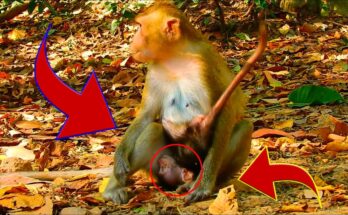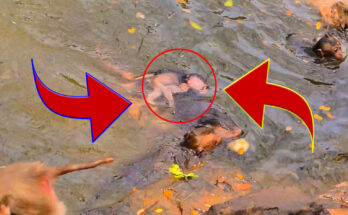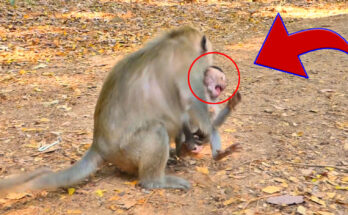In a tragic turn of events, the Capzila monkey group has been shaken by the untimely death of one of its youngest members, a baby monkey who had captured the hearts of all who encountered it. The baby monkey’s death has left both the monkey community and the zoo staff deeply saddened, marking a heart-wrenching moment in the lives of those who have closely followed the Capzila group’s story.
The Capzila group, a troop of monkeys housed in a well-known wildlife sanctuary, has been a focal point of attention for animal lovers and researchers alike. Known for their dynamic social structure and complex behaviors, the group has flourished in an environment designed to mimic their natural habitat. The baby monkey, born to a young mother who was still learning the ropes of motherhood, had been a source of both joy and concern since its birth. Staff at the sanctuary had been especially attentive, watching closely as the infant monkey adapted to its new life, trying to establish a bond with its mother and the rest of the group.
Despite initial signs of a healthy and active start to life, the baby monkey’s condition began to deteriorate unexpectedly. Though it had appeared to be thriving, the young animal suddenly started showing signs of distress. Caregivers noticed a lack of energy, a decline in appetite, and a significant decrease in interaction with other members of the troop. Such changes can often be difficult to pinpoint in infant primates, as their vulnerability to illness or emotional distress can be heightened in the first few months of life.
As the situation worsened, the sanctuary staff worked tirelessly to provide medical assistance to the baby monkey. Vets were called in for examinations, and specialists tried to determine whether the infant was suffering from an underlying health issue, such as a nutritional deficiency, an infection, or even a psychological issue linked to the bonding process. Unfortunately, despite all the efforts to save it, the baby monkey succumbed to its illness and passed away, leaving the sanctuary and the Capzila group to mourn its loss.
The death of a baby monkey is particularly difficult for the other members of the group, as primates, especially monkeys, form close-knit social bonds. Infant monkeys rely heavily on their mothers for nourishment, warmth, and protection, and their death often disrupts the emotional and social equilibrium of the entire troop. For the mother, the loss can be especially devastating, as it marks the end of an emotional journey that began with the anticipation of motherhood.
The sanctuary’s staff, who had grown attached to the baby monkey, expressed their deep sorrow over the tragic event. They emphasized that, while the loss was heartbreaking, the team had done everything they could to help the infant survive and thrive. They noted the importance of providing ongoing care to the other members of the group, especially the mother, who might experience a form of grief following the loss of her baby.
In a statement issued by the sanctuary, the team expressed their condolences and explained the steps they would take moving forward. “We are deeply saddened by the loss of our beloved baby monkey. The Capzila group, like all animal groups, relies on the bonds between members, and losing such a young life is a reminder of the fragile nature of existence. We will continue to ensure that the rest of the troop receives the care and attention they need to recover emotionally,” the statement read.
The death of the baby monkey has also raised awareness about the challenges faced by young animals in captivity, where the complexities of life and death often become magnified. Wildlife sanctuaries and zoos strive to provide the best care possible, but the emotional and physical well-being of infant monkeys can be a delicate balancing act. With their fragile immune systems, young monkeys are at risk of various illnesses, and the absence of their mothers in some situations can cause significant emotional stress. Such incidents serve as poignant reminders of the unpredictability of life and the responsibility humans have in caring for and protecting wildlife.
As the Capzila group moves forward, the memory of the baby monkey will remain in the hearts of all who witnessed its short life. Though the loss is a painful one, it is also a testament to the dedication of those who work to protect and care for these incredible creatures. In the end, the hope is that the tragedy will inspire even more compassion and efforts to ensure the survival and well-being of future generations of monkeys and other wildlife in the sanctuary.


